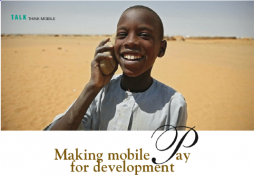poverty reduction
Posted by kelechiea on Sep 13, 2011
‘We Use It Different, Different’: Making Sense of Trends in Mobile Phone Use in Ghana data sheet 1760 Views
Abstract:
Drawing on ideas from the sustainable livelihoods approach to poverty reduction and the concept of technology appropriation, this article discusses findings from a mixed methods study exploring mobile phone use in Ghana. The results suggest that most respondents value their phone for the connectivity it affords with a variety of personal and professional contacts. In this sense, the mobile phone is not an overt means of poverty reduction for respondents but an integral part of their lives, in which it serves multiple functions. The study contributes empirical data to the emerging body of research on mobile phone communication in African countries
Posted by MohiniBhavsar on Sep 14, 2010
Mobile Cell Phones and Poverty Reduction: Technology Spending Patterns and Poverty Level Change among Households in Uganda data sheet 403 Views
Abstract:
This paper examines the spending behavior of households with mobile phones in rural agricultureal Uganda and whether such strategies such as substitutions have affected the well-being of these community members. According to the findings, rural households are willing to make sacrifces such as travel expenses and store-bought food budget in order to address the expenses of mobile phone services. While gender inequality through exacerbated asset control and mobile phone inexperience drive further digital divide in this village, the proliferation of small businesses development encourages phone ownership for women. Such strategies to afford a mobile phone or mobile phone services are undertaken to help facilitate long-term asset accumulation. For development studies, the analysis recommends a revised form of development thinking in a growing knowledge economy.
Posted by AnneryanHeatwole on Oct 08, 2009
Mobile Phones and Development: An Analysis of IDRC-Supported Projects data sheet 3222 Views
Author:
Ahmed T. Rashid, Laurent Elder
Abstract:
In the context of the rapid growth of mobile phone penetration in developing countries, mobile telephony is currently considered to be particularly important for development. Yet, until recently, very little systematic evidence was available that shed light on the developmental impacts of mobile telecommunication.
The Information and Communication Technology for Development (ICT4D) program of the International Development Research Centre (IDRC), Canada, has played a critical role in filling some of the research gaps through its partnerships with several key actors in this area.
The objective of this paper is to evaluate the case of mobile phones as a tool in solving development problems drawing from the evidence of IDRC supported projects. IDRC has supported around 20 projects that cut across several themes such as livelihoods, poverty reduction, health, education, the environment and disasters. The projects will be analyzed by theme in order to provide a thematic overview as well as a comparative analysis of the development role of mobile phones. In exploring the evidence from completed projects as well as the foci of new projects, the paper summarizes and critically assesses the key findings and suggests possible avenues for future research.
Posted by sharakarasic on Nov 01, 2008
On day three of MobileActive ’08, I attended a session led by Pragnya Alekal of the XPrize Foundation. Pragnya is a water sanitation and energy engineer who has spent a lot of time in the field. She stressed that technology has its limitations – it’s not the whole solution. Her entire goal has been to make up for the fact that technology is important while encompassing other factors.
Alekal told us that XPrize’s goal is to revolutionize sectors – they have a commons-based philosophy. Pragnya was at MobileActive ‘08 to get ideas. How do you solve poverty? How do you get more people to think of solutions?
Alekal told us the history of XPrize, which started with a big dream and got scaled out. It was founded by Peter Diamandes – from the age of nine on, he wanted to go to space. He became a rocket scientist and got six degrees. He felt that the astronaut program was too restrictive. If you are non-American like he is, your chances of becoming an astronaut are low. The number of people who make it into space is very small.
Posted by KatrinVerclas on Oct 25, 2008
This article, in a slightly revised version, was published by Orascom's TALK Magazine, Fall 2008.
There has been much talk of late about mobile financial services as a way to lift millions of people worldwide out of poverty. A recent article in The Guardian called mobile banking in developing countries “potentially revolutionary.” The advent of mobile financial services promises to bring many more poor people into an economic mainstream where safer and less costly financial services (such as person-to-person payments and remittances) are delivered over the cell phone. But is this promise anywhere near reality?
Transferring money via mobile phones can save days of travel for workers in cities who send money home to families in rural villages. Mobile payments are also often cheaper and more secure than relying on informal brokers or carrying cash personally, and they have the potential to change markets by making small business-to-business transactions immediate and more reliable.

